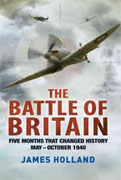The Battle of Britain
James Holland
book reviews:
· general fiction
· chick lit/romance
· sci-fi/fantasy
· graphic novels
· nonfiction
· audio books
· author interviews
· children's books @
curledupkids.com
· DVD reviews @
curledupdvd.com
newsletter
win books
buy online
links
home
for authors
& publishers
for reviewers

 |
The Battle of Britain: Five Months That Changed History; May-October 1940 James Holland St. Martin's Griffin Paperback 736 pages February 2012 |
|
Many think that the "Battle of Britain" during World War II consisted only of the air battle over the island nation as the German air force attempted to neutralize that of the British to facilitate a German invasion of the country. Historian James Holland disputes that The Battle of Britain: Five Months That Changed History
Holland is able to do this because many of his sources are journals by or actual interviews with those who were involved in the day-to-day terror and bravery of the effort. The Battle of Britain The book covers not just the air war, not just the land war, but also the war at sea. The summer and early autumn of 1940 were desperate times for Great Britain. France had fallen; Winston Churchill was working tirelessly to involve the United States in the war, but Britain was basically alone. German submarines were exacting a horrific toll on shipments that were intended to supply the country with food and other necessities. Holland includes journal or interview examples from each segment of the war, so he is able to give a quite complete picture of the entire conflict. Especially interesting is how bad Holland makes American ambassador Joseph Kennedy look, and also how much he rehabilitates former Prime Minister Neville Chamberlain. Kennedy is depicted as a defeatist soon sidelined by Churchill and others in the British government. Certain that Britain should sue for peace because they cannot win, he strongly resisted any attempts by Churchill to get Roosevelt involved in the fight. On the other hand, Chamberlain is often only remembered for the appeasement of the Czechoslovakia meeting, where he basically handed the country over to Germany. Many lost faith in Chamberlain, and shortly after the invasion of France, he was forced out of the Prime Minister role. What I hadn't known was how close he and Churchill were, and how Chamberlain remained a close advisor to Churchill until Chamberlain died on November 9. He lived to see Britain weather the German storm. Holland's makes plain his personal opinion of some of the personalities (especially Chamberlain and Kennedy). Some readers might say that he should be more objective with his language in writing about them. That didn't bother me but should be noted in case it could affect others' enjoyment of the book. An additional item is the notation system used in the book. There are the occasional footnotes, but all other notes are at the end of the book. Thankfully, Holland actually gives readers the page numbers so that they can follow along rather than just having to guess where a note may be used. For the most part, notations are only for sources. Unlike some historians, Holland does not use the notations to further expand on a point made in the main text. If you are only reading for information, they can mostly be ignored or examined later. One final thing I appreciated in The Battle of Britain That makes a fitting tribute and conclusion to a wonderful book that takes one of the most important battles of World War II and breaks it down effectively into its component parts. Holland's writing style is easy to follow and drags the reader into his narrative. That's the sign of an extremely effective history book, and a must-read. Originally published on Curled Up With A Good Book at www.curledup.com. © Dave Roy, 2012 |
|
|
|
 Click here to learn more about this month's sponsor! |
|
| fiction · sf/f · comic books · nonfiction · audio newsletter · free book contest · buy books online review index · links · · authors & publishers reviewers |
|
| site by ELBO Computing Resources, Inc. | |
 The trick Holland uses is the ability to bring the battles home to the reader with intimate accounts of the war efforts, both in their planning and execution. Holland does spend considerable time on the pilots and the air force tactics, both in the traditional sense and as it pertains to the French invasion and the evacuation of the British forces at Dunkirk. He also covers the invasion of France itself, the strategy and tactics used by the Germans to gain surprise and cut the Allied forces in two. He discusses the big picture but also zooms in on individual pilots and soldiers, taking the reader down into the heart of the fighting.
The trick Holland uses is the ability to bring the battles home to the reader with intimate accounts of the war efforts, both in their planning and execution. Holland does spend considerable time on the pilots and the air force tactics, both in the traditional sense and as it pertains to the French invasion and the evacuation of the British forces at Dunkirk. He also covers the invasion of France itself, the strategy and tactics used by the Germans to gain surprise and cut the Allied forces in two. He discusses the big picture but also zooms in on individual pilots and soldiers, taking the reader down into the heart of the fighting.